Iran FM Claims Mahsa Amini Died Of Natural Causes
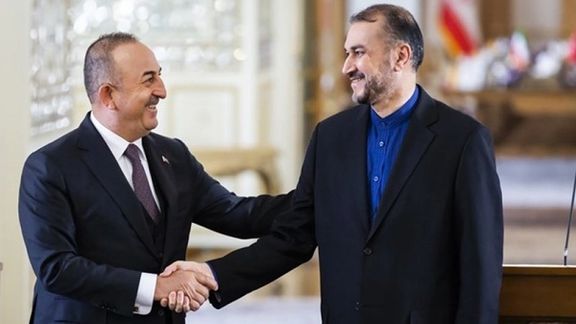
Iran's foreign minister, who has traveled to Turkey, once again repeated the claim by the Islamic Republic authorities that Mahsa Amini "died of natural causes".

Iran's foreign minister, who has traveled to Turkey, once again repeated the claim by the Islamic Republic authorities that Mahsa Amini "died of natural causes".
Hossein Amir-Abdollahian made the comments in a joint press conference with Turkish Foreign Minister Mevlüt Çavuşoğlu on Tuesday.
“In Iran, women enjoy freedom and a high degree of rights. The fact that an Iranian girl died of natural causes made us sad,” he added.
These statements are made in a situation that the case of Mahsa Amini's death has not yet been officially concluded, while overwhelming evidence from hospital and x-rays showed she received fatal head injuries in Hijab police custody.
Mahsa Amini, the 22-year-old girl died on September 16, three days after her arrest. Amini was arrested for allegedly not wearing the hijab in accordance with standards. The Law Enforcement Command of the of Iran stated she had a heart attack at a police station, collapsed, and fell into a coma before being transferred to a hospital. However, eyewitnesses, including women who were detained with Amini, reported that she was severely beaten and that she died as a result of police brutality which was denied by the Iranian authorities.
Amini’s death and the publication of pictures of her caused a wave of anger and protest in Iran which has been going on for months.
In another part of his statements in Turkey, Amir-Abdollahian once again accused the West of playing a role in Iran's nationwide protests.
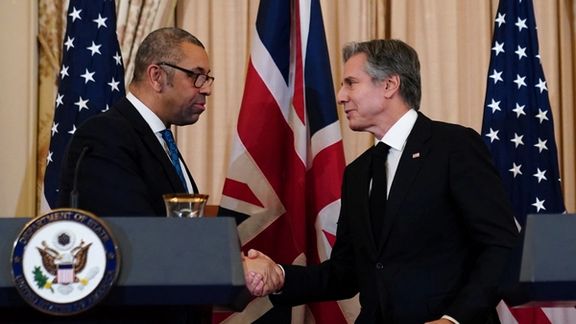
The United States is appalled by Iran's execution of Alireza Akbari, Secretary of State Antony Blinken said at a joint news conference with his British counterpart.
He also vowed that Islamic Republic's deadly violations of rights in its crackdown of widespread protests will not go unpunished.
Blinken and UK Foreign Secretary James Cleverly also voiced support for the Iranian people.
“We’ll keep standing with the brave Iranians who are standing up for their own basic rights led by young women – all of this in the face of extraordinary repression,” he said as the protest movement entered its fifth month.
"We were appalled by the execution of Mr. Akbari just as we've been appalled by everything we've been seeing on the streets of Iran over the last months since these protests began: mass arrests, sham trials, the executions, the use of sexual violence as a tool for protests' suppression," Blinken said at the news conference.
"These abuses will not go without consequence. Together with many other countries, we've been moving forward with a variety of unilateral actions, multilateral measures, using UN mechanisms, to try to hold Iran to account," he added.
Akbari, 61, a British-Iranian national who once served as Tehran's deputy defence minister, was handed a death sentence on charges of spying for Britain.
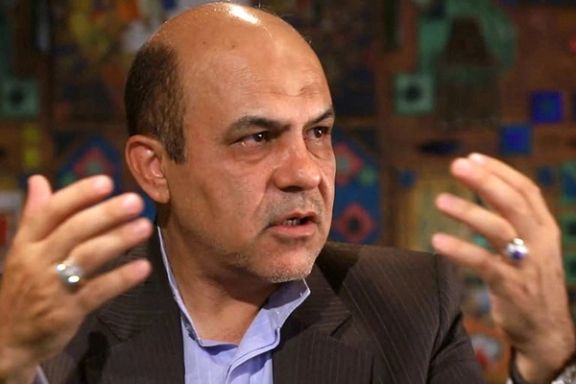
London has said the charges against him were politically motivated. It repeatedly called for his release. Following the execution, it imposed sanctions on Iran's Prosecutor General.
Cleverly thanked the United States for its support. “I’m very grateful to the United States of America for publicly condemning the execution and for Secretary Blinken expressing his condolences in our meeting a few moments ago,” the foreign secretary said.
What was also notable, was Cleverly’s emphasis on Iran’s activities outside its borders in regional countries and its supply of kamikaze drones to Russia used against Ukrainian civilian infrastructure.
“For years, Iran’s leadership have inflicted bloodshed on their regional neighbors by arming and supporting military extremists and militias. Now Iran has gone further and supplied Russian with the drones that were used to kill civilians in Ukraine. And the UK will join with the US and other allies to hold the Iranian regime to account for the violations of the rights of their own people and by making themselves accomplices to Putin’s assault on Ukraine,” British foreign minister said.
As nuclear talks between the Islamic Republic and the West have reached a deadlock, both Tehran’s crackdown on people and its foreign policy have become major stumbling blocks to resuming negotiations. Cleverly’s mention of these factors shows that the West will insist on a major change of behavior by Tehran for any renewed diplomacy.
Cleverly made this point very clear: They call – they call for us, for the US, for us, and our friends to lift sanctions. And the point that we have made is that if they want to see those sanctions removed, they have to fundamentally change their behavior.
At the same time he left the door open for dialogue with Tehran. “But we will continue to speak to Iran where we’re able to and we hope that at some point soon they will listen properly to what we’re saying…”
Blinken in turn repeated Washington’s position that it was Tehran’s fault the nuclear talks came to a halt and the US is now focused on what is happening inside the country and not on the nuclear issue. He also emphasized President Joe Biden’s position, “that Iran never acquire a nuclear weapon.”
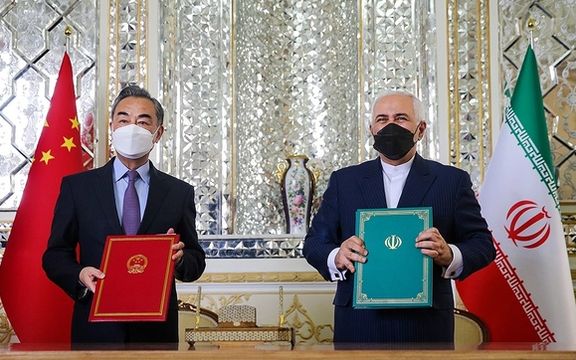
A former Iranian ambassador to China says the Tehran-Beijing 25-year agreement is overestimated and only worked as a bargaining chip for China to secure deals with Saudi Arabia.
Mohammad-Hossein Malaek, who served as Tehran’s envoy for four years under former president Mohammad Khatami, told the Iranian Labour News Agency on Tuesday that the 25-year strategic agreement is a document without any value, especially following the visit by Chinese President Xi Jinping to Saudi Arabia in December.
He noted that the visit has opened a new chapter in Iran-China relations, therefore the agreement should be revised as Tehran and Beijing had different agendas at the time the document was signed.
Malaek claimed that the agreement -- which is wrapped in mystery and so far has had little practical results – made China more interesting for Arab countries and incentivized them to give Beijing many economic and political benefits, as it was seen during the Chinese president’s recent visit to the region. W
When the document was signed, then-foreign-minister Mohammad Javad Zarif was accused of being reluctant to cooperate with China, so with signing an agreement, which does not include any practical measures and is not a binding contract, Zarif managed to exonerate himself from those accusations. “Therefore, this document is no longer the document for which they wrote stories [in Iranian media]," he said, noting that at the beginning, they made a lot of noise about the deal, but no progress has been made and “we are still at the same point.”
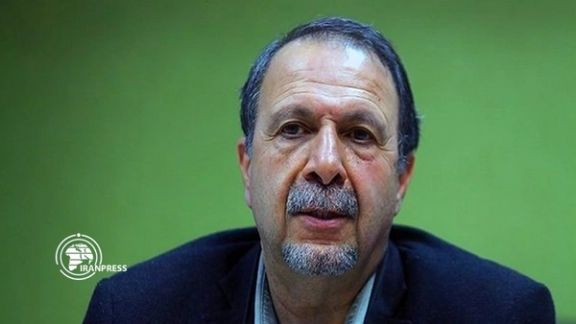
Zarif and his Chinese counterpart Wang Yi on March 27, 2021, signed the controversial 25-year deal at a ceremony at the Iranian Foreign Ministry in Tehran. The deal was first proposed by Iran's Supreme Leader Ali Khamenei during President Xi’s visit to Tehran in 2016.
The pact has been very controversial in Iran because its details have never been disclosed. A leaked copy of the final text only outlines the general terms of the agreement, but Tehran officials, beleaguered by economic crisis they cannot solve, hoped it will bring billions in investment and make Iran part of China' Belt and Road Initiative, a multi-trillion-dollar infrastructure scheme intended to stretch from East Asia to Europe. The project aims to significantly expand China's economic and political influence and has raised concerns in the United States and elsewhere.
Malaek added that the Islamic Republic needs foreign investors in the field of oil and gas, and it has nothing to do with signing the document or not. Sanctions have stopped Iran's cooperation with Western companies, and only Russian and Chinese companies may invest in the country. However, he said that China abides by the sanctions and does not violate any of them at all when it feels any threat to its own interests.
Iran has indicated its intention to rely more on Asian countries, particularly China for trade relations as talks with the United States and Europe to resolve differences over Tehran’s nuclear program have not succeeded so far and US sanctions remain in place. However, Beijing has so far has not seriously challenged US sanctions, as it has cultivated closer ties with the Persian Gulf Arab countries and Israel.
Many Iranians have expressed resentment over the 25-year cooperation agreement with China and a proposed 20-year deal with Russia, saying it is a sell-out. Although Iran has not revealed the details of the agreement with China and what it will entail in political, economic and military terms, some social media users go as far as claiming that the Islamic Republic is "selling out the country and its people" to China and Russia.
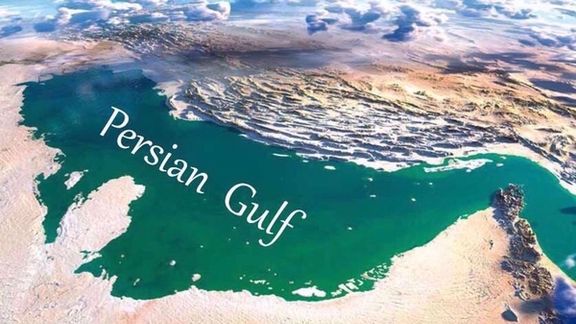
Iran's foreign ministry spokesman says Tehran has protested to Iraq over once again using “a fake misnomer” for the Persian Gulf.
Iran's foreign ministry spokesman says Tehran has protested to Iraq over once again using “a fake misnomer” for the Persian Gulf.
Responding during his press briefing Tuesday to a question over the Iraqi Prime Minister Mohammed Shia’ al-Sudani’s insistence on calling the Persian Gulf as the “Arabian” Gulf, Naser Kanaani said the foreign ministry has sent a letter of protest to the government of Iraq.
The name Persian Gulf is “a historical, permanent, documented and undeniable fact,” he said and added that “repeating the fake name does not change facts and brings no legitimacy to it.” He also alleged that Iraq was using the controversial term to appeal to “others”, presumably Iran's Arab rival Saudi Arabia.
Iran's foreign ministry usually protests if foreign officials use alternative names to refer to the Persian Gulf in view of strong feelings among Iranians over the matter who have launched petitions on various occasions to protest to the use of “Gulf” instead of “Persian Gulf” by foreign officials and media such as former US President Barack Obama and the BBC.
“Despite having strategic, fraternal, and deep relations with Iraq, we have openly conveyed our protest with regards to the issue, summoned the Iraqi ambassador and reminded the Iraqi side of the great Iranian nation’s sensitivities about the use of the precise and full term, the Persian Gulf,” Foreign Minister Hossein Amir Abdollahian said January 11 but also claimed that Al-Sudani had “corrected the matter on social media.”
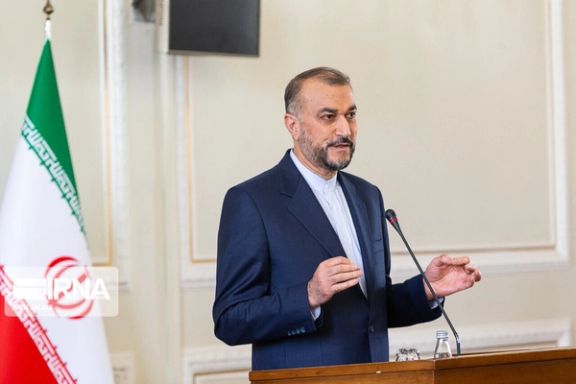
Tehran summoned the Iraqi ambassador Nasir Abdul Mohsen Abdullah to the foreign ministry on January 11 to voice its strong protest over the use of the misnomer.
At the opening ceremony of a regional football tournament, the 25th Arabian Gulf Cup, in Basra on January 6, Al-Sudani referred to the body of water separating Iran from its several Arab neighbors as the “Arabian Gulf” and despite Iran's protest, in an interview with Deutsche Welle Saturday defended his use of the controversial term and said he would not apologize to Iran for using what Kanaani referred to as a “misnomer” and “fake title”.
The historic waterway has been referred to as the Persian Gulf since ancient times including in historical Greek sources and is still referred to as such in official documents of the United Nations. Since 1960s, Arab governments have increasingly been using The Gulf or Arabian Gulf and officials of other countries and some international organizations have followed suit.
“Using the fake label for the Persian Gulf is seen in Iran as a futile attempt by the Arab neighbors to distort the region’s ancient history,” the IRGC-linked Fars news agency wrote Tuesday.
For Iraq’s prime minister using the term “Arabian Gulf” is seen by many Iranians as another sign of the Iranian regime’s costly efforts to gain influence in its neighboring country, relying on Shia proxy forces and clerics.
Some Iranian media and pundits say Al-Sudani’s insistence on using a name that he knew would irritate Iranians may be a sign that the Shia-majority Iraq is increasingly restoring its ‘Arab’ identity and getting closer to other Arab nations which are Sunnis, despite their seemingly better relations with Shia Iran over much of the past two decades.
Abdolreza Farajirad, diplomatic relations analyst, told the Iranian Labour News Agency (ILNA) Tuesday that all Iraqi premiers after Nouri al-Maleki have tried to mend their relations with the Arab world and go back to their Arab identity and culture. “For them the Arabic identity has priority and the [Shia] religious identity comes second,” he said.
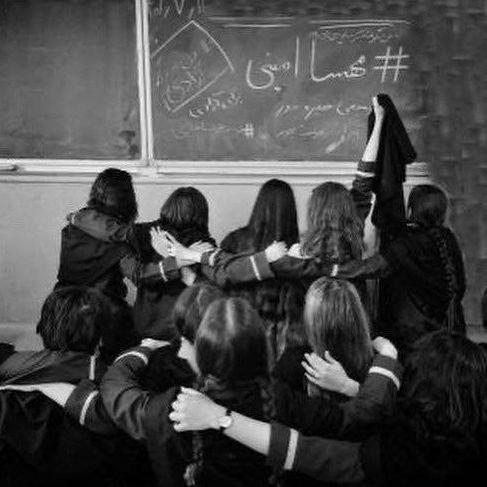
An Iranian newspaper in Tehran says four months into the academic year in Iran, students have attended school for only 38 days.
Farhikhtegan newspaper reported Tuesday that one of the reasons for school closures has been the nationwide protests following the death of Mahsa Amini in police custody in mid-September.
The protests were extended to schools, and not only did a large number of students support it, but also many were subjected to violence by the security forces and arrested.
The newspaper also mentioned air pollution, unprecedented cold snap, snowfall and heavy rain, and the national football team's matches in the World Cup in Qatar as other reasons for school closures.
Farhikhtegan warned that "If it continues like this, that would be the end of public education in the country."
Meanwhile, Iran’s Parliament Research Center reported a 17% increase in the number of students who are left out of school compared to the previous six years.
According to the report, the number of students who missed school this year is more than 900 thousand.
The children are left out of schools are those who come from poorer families.
The five provinces of Sistan and Baluchestan, Razavi Khorasan, Tehran, oil-rich Khuzestan and West Azerbaijan have the highest number of students deprived of education.
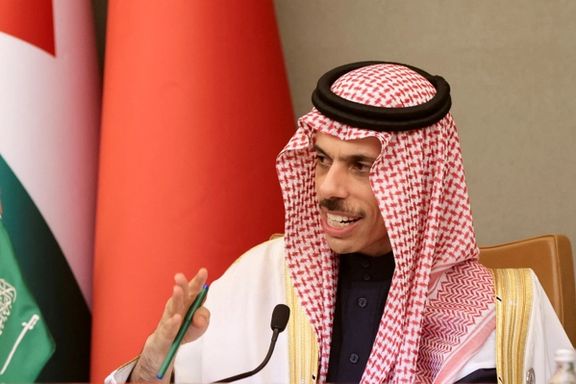
Saudi Foreign Minister Prince Faisal bin Farhan Al Saud said the kingdom was trying to find a path to dialogue with Iran as the best way to resolve differences.
He said a decision by Saudi Arabia and other Gulf states to focus on their economies and development was a "strong signal to Iran and others in the region that there is a pathway beyond traditional arguments and disputes towards joint prosperity".
Tensions spiked between Saudi Arabia and Iran after Tehran got involved in Syria’s civil war in 2011 and began building a network of proxy forces in the region.
Riyadh and Tehran cut ties in 2016 but officials from the two countries have held five rounds of direct talks hosted by Iraq since last year without achieving any diplomatic breakthroughs.
Arab states around the Persian Gulf are concerned about Iran's nuclear and ballistic missile programs and network of regional proxies but want to contain tensions as they focus on economic priorities.
"This is complex question, but we will have to talk about how we find a pathway to ending the conflict," he said.
Prince Faisal said attention on the Middle East was also needed, citing Syria as well as regional concerns over "provocative policies" by Israel's new government headed by Benjamin Netanyahu in an alliance with ultra-nationalists.
Netanyahu has pledged to pursue formal Israeli ties with Riyadh to build on normalization pacts signed with the United Arab Emirates and Bahrain in 2020 under his leadership.
Saudi Arabia blessed the US-brokered pacts but stopped short of formally recognizing Israel in the absence of a resolution to Palestinian statehood goals.
Reporting by Reuters